美国100位历史名人榜(12):林肯的得力将军Grant
林肯美国历史伟人

林肯美国历史伟人林肯(Abraham Lincoln)是美国历史上一位伟大的领导者和思想家。
作为美国第16任总统,他在美国内战时期的政治和军事领导上扮演了重要角色。
林肯以他的智慧、坚韧和慈悲赢得了国民的尊重,并为美国的奴隶制废除做出了极大贡献。
一、童年与教育林肯于1809年2月12日在肯塔基州的一个小农场出生。
他是家中的第二个孩子,成长在一个农民家庭。
尽管他的家庭贫困,但林肯的父亲教育了他对读书和学习的渴望,并鼓励他追求教育。
林肯的教育程度有限,但他用自己的毅力和努力成为一名自学成才的律师。
他经历过贫困、挫折和失败,但这些经历塑造了他坚韧的性格和对正义的追求。
二、政治生涯的起步林肯在1834年开始他的政治生涯,当选为伊利诺伊州的州议会议员。
他通过演讲和辩论赢得了人们的支持和注意。
他的聪明才智和对平等的执着迎来了他政治道路上的成功。
林肯反对奴隶制度的存在,并积极参与了在国会中对此展开的辩论。
他坚信没有任何人天生就应该是奴隶,而且他认为奴隶制悖于美国宪法所宣扬的平等原则。
三、内战时期的领导力1861年,林肯当选为美国总统,这是一个充满挑战和危机的时刻。
南北方两派之间日益尖锐的矛盾最终引爆了美国内战。
林肯不仅需要处理军事战略和战争问题,还需要处理国内的政治纷争。
尽管面临巨大压力,但林肯表现出了卓越的领导力。
他据理力争,采取了一系列正确的政策和行动,以确保联邦政府的统一,并最终获得了北方人民的胜利。
他在解放奴隶方面的决心也为战后的重建打下了良好基础。
四、奴隶制度的废除林肯的最重要政治成就之一就是在1863年签署了《解放奴隶宣言》。
这一法案废除了美国的奴隶制度,从根本上改变了美国社会的格局,并迈向了一个更加平等和正义的未来。
通过废除奴隶制度,林肯彻底改变了美国的历史进程,确保了所有人都能享受自由和平等的权利。
他对平等的坚持和勇气激励了无数人,成为了美国历史上的一位伟人。
五、林肯的遗产在林肯的领导下,美国经历了一段艰难的时期,但也取得了巨大的进步。
世界伟人先进事迹和故事

世界伟人先进事迹和故事世界上有许多伟人,他们因为自己的卓越功绩和先进思想成为世界历史的一部分。
他们各有所长,有的在军事领域有所建树,有的在音乐或艺术方面创造出了不朽的作品,更有些人为社会进步和人类文明的发展做出了重要贡献。
下面就让我们来看看其中一些世界著名人士的先进事迹和故事。
1. 亚伯拉罕·林肯亚伯拉罕·林肯是美国历史上最著名的总统之一,他也被誉为一个卓越的领袖、斗士和智者。
他在民主、平等、自由等伦理和思想方面做出了卓越的贡献。
林肯对不公正的奴隶制度进行了斗争,最终实现了废除奴隶制。
他还推动了美国内战的胜利,加强了中央政府的权利,使联邦政府成为强大的实体。
林肯的先进思想和领导才能值得每个人学习。
他是一位具有坚定意志和不畏艰难的伟人,他致力于实现美好的梦想,同时也了解到人性弱点的真相。
总之,他是一个兼具勇气、智慧和同情心的人。
2. 马丁·路德·金马丁·路德·金是美国民权运动的领袖之一,通过和平、非暴力的手段推动了黑人的平等权利。
他的方法影响了整个美国和世界,无数人因此得到了公正和和平。
在他的影响下,种族隔离的问题也逐渐得到解决。
马丁·路德·金是一位先知,他勇于挑战社会不平等和不公的现状,积极寻求和平的解决方案。
鉴于他所做出的巨大贡献,他的理念已经超越了种族、阶级和国界的差异,成为了一个世界范围内的共识。
3. 爱因斯坦爱因斯坦是著名的物理学家和天才,因他的科学成就成为世界上最有名的科学家之一。
他发明了相对论,此后他的想法一直在发展,并且对科学有了很大的影响。
他还是一个反战活动家,在世界大战期间反对军备竞赛,呼吁和平与合作。
爱因斯坦是一个才华横溢、充满智慧的人,他也是一个勇于保持独立思考和坚持自己信念的人。
他对文明和科学的发展做出了非常有价值的贡献。
他的成就让我们意识到了人类文明的发展潜力和积极性。
4. 达芬奇达芬奇是世界著名的艺术家、音乐家和科学家。
影响美国的100位人物

根据互联网资料编制2010.11点击鼠标翻页•2006年底,美国的权威期刊《大西洋月刊》编辑部邀请十位著名历史学家,其中有四位是普利策奖获得者,投票选举100位美国历史上最具影响力的人物。
•关于“影响”的定义•专家们的依据之一是人物的综合影响力。
•第二个依据来自流行文化。
•但市场并不是万能钥匙,道德标准必须考虑。
历史功勋中的政治因素也是评判的标准之一。
•专家们认为:伟大的公众人物应该给人们的生活带来巨大的变化,从物质、精神和文化层面影响了美国。
•也许这个排行榜里没有你喜欢的人物,如克林顿、施瓦辛格、斯皮尔伯格、拳王阿里、“飞人”乔丹等,他们的魅力系数并不比排行榜中的大多数人物低,只是对历史人物的评价往往不是同一时代的历史学家敢贸然判定的。
•亚伯拉罕·林肯(1809~1865):拯救了国家,解放了黑奴,再造了美国。
№1亚伯拉罕·林肯•乔治·华盛顿(1732~1799):缔造了美利坚合众国,赶走了一个国王,也拒绝成为国王。
№2乔治·华盛顿•托马斯·杰斐逊(1743~1826):《独立宣言》主要起草人,写下了美国历史上分量最重的五个字:“人生而平等”。
№3.托马斯·杰斐逊•富兰克林·罗斯福(1882~1945):他告诫逆境中的美国:“我们唯一恐惧的就是恐惧本身”。
№4.富兰克林·罗斯福•亚历山大·汉密尔顿(1755~1804):战士、银行家、科学家、政治家,他带领美国从农业社会走向了工业社会。
№5.亚历山大·汉密尔顿•本杰明·富兰克林(1706~1790):科学家、作家,发明家、外交家。
№6.本杰明·富兰克林•约翰·马歇尔(1755~1835):美国最高法院首席法官,三权分立制度的主要创建人。
№7.约翰·马歇尔•小马丁·路德·金(1929~1968):用慷慨激昂的演讲,抒发种族平等的梦想,虽然道路漫长而艰险,但没有其他人能比他看得更高,走得更远。
美国国家的拯救者:林肯
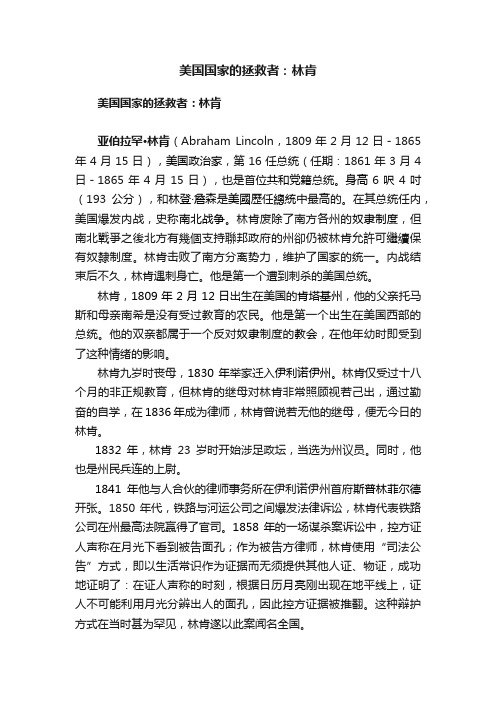
美国国家的拯救者:林肯美国国家的拯救者:林肯亚伯拉罕·林肯(Abraham Lincoln,1809年2月12日-1865年4月15日),美国政治家,第16任总统(任期:1861年3月4日-1865年4月15日),也是首位共和党籍总统。
身高6呎4吋(193公分),和林登·詹森是美國歷任總統中最高的。
在其总统任内,美国爆发内战,史称南北战争。
林肯废除了南方各州的奴隶制度,但南北戰爭之後北方有幾個支持聯邦政府的州卻仍被林肯允許可繼續保有奴隸制度。
林肯击败了南方分离势力,维护了国家的统一。
内战结束后不久,林肯遇刺身亡。
他是第一个遭到刺杀的美国总统。
林肯,1809年2月12日出生在美国的肯塔基州,他的父亲托马斯和母亲南希是没有受过教育的农民。
他是第一个出生在美国西部的总统。
他的双亲都属于一个反对奴隶制度的教会,在他年幼时即受到了这种情绪的影响。
林肯九岁时丧母,1830年举家迁入伊利诺伊州。
林肯仅受过十八个月的非正规教育,但林肯的继母对林肯非常照顾视若己出,通过勤奋的自学,在1836年成为律师,林肯曾说若无他的继母,便无今日的林肯。
1832年,林肯23岁时开始涉足政坛,当选为州议员。
同时,他也是州民兵连的上尉。
1841年他与人合伙的律师事务所在伊利诺伊州首府斯普林菲尔德开张。
1850年代,铁路与河运公司之间爆发法律诉讼,林肯代表铁路公司在州最高法院赢得了官司。
1858年的一场谋杀案诉讼中,控方证人声称在月光下看到被告面孔;作为被告方律师,林肯使用“司法公告”方式,即以生活常识作为证据而无须提供其他人证、物证,成功地证明了:在证人声称的时刻,根据日历月亮刚出现在地平线上,证人不可能利用月光分辨出人的面孔,因此控方证据被推翻。
这种辩护方式在当时甚为罕见,林肯遂以此案闻名全国。
是林肯主张,新的领土必须是自由之邦。
为此,他发表了著名的《分裂的房子》(House Divided Speech)演说:分裂的房子必不能持久,一半奴役一半自由的政府绝不能持久。
【名人故事】林肯智胜埃弗雷特
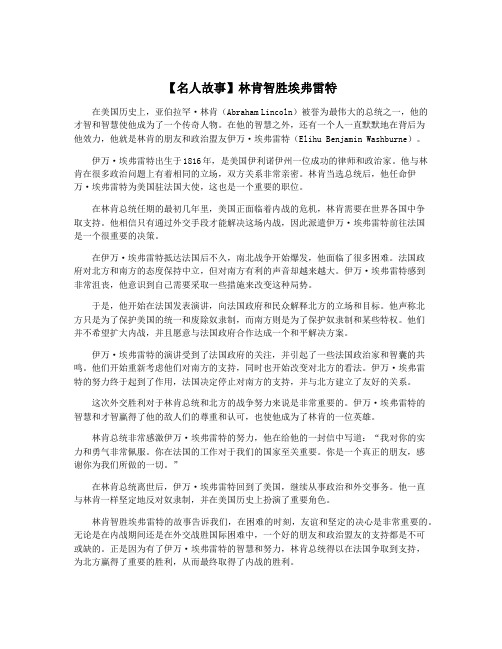
【名人故事】林肯智胜埃弗雷特在美国历史上,亚伯拉罕·林肯(Abraham Lincoln)被誉为最伟大的总统之一,他的才智和智慧使他成为了一个传奇人物。
在他的智慧之外,还有一个人一直默默地在背后为他效力,他就是林肯的朋友和政治盟友伊万·埃弗雷特(Elihu Benjamin Washburne)。
伊万·埃弗雷特出生于1816年,是美国伊利诺伊州一位成功的律师和政治家。
他与林肯在很多政治问题上有着相同的立场,双方关系非常亲密。
林肯当选总统后,他任命伊万·埃弗雷特为美国驻法国大使,这也是一个重要的职位。
在林肯总统任期的最初几年里,美国正面临着内战的危机,林肯需要在世界各国中争取支持。
他相信只有通过外交手段才能解决这场内战,因此派遣伊万·埃弗雷特前往法国是一个很重要的决策。
在伊万·埃弗雷特抵达法国后不久,南北战争开始爆发,他面临了很多困难。
法国政府对北方和南方的态度保持中立,但对南方有利的声音却越来越大。
伊万·埃弗雷特感到非常沮丧,他意识到自己需要采取一些措施来改变这种局势。
于是,他开始在法国发表演讲,向法国政府和民众解释北方的立场和目标。
他声称北方只是为了保护美国的统一和废除奴隶制,而南方则是为了保护奴隶制和某些特权。
他们并不希望扩大内战,并且愿意与法国政府合作达成一个和平解决方案。
伊万·埃弗雷特的演讲受到了法国政府的关注,并引起了一些法国政治家和智囊的共鸣。
他们开始重新考虑他们对南方的支持,同时也开始改变对北方的看法。
伊万·埃弗雷特的努力终于起到了作用,法国决定停止对南方的支持,并与北方建立了友好的关系。
这次外交胜利对于林肯总统和北方的战争努力来说是非常重要的。
伊万·埃弗雷特的智慧和才智赢得了他的敌人们的尊重和认可,也使他成为了林肯的一位英雄。
林肯总统非常感激伊万·埃弗雷特的努力,他在给他的一封信中写道:“我对你的实力和勇气非常佩服。
影响美国的100位人物
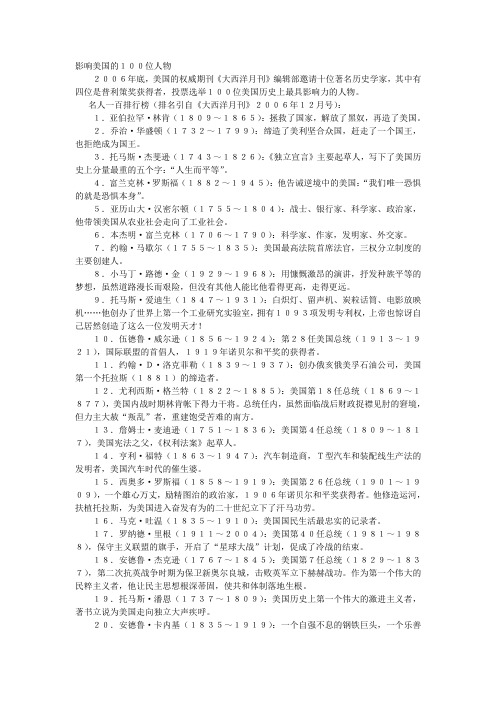
影响美国的100位人物2006年底,美国的权威期刊《大西洋月刊》编辑部邀请十位著名历史学家,其中有四位是普利策奖获得者,投票选举100位美国历史上最具影响力的人物。
名人一百排行榜(排名引自《大西洋月刊》2006年12月号):1.亚伯拉罕·林肯(1809~1865):拯救了国家,解放了黑奴,再造了美国。
2.乔治·华盛顿(1732~1799):缔造了美利坚合众国,赶走了一个国王,也拒绝成为国王。
3.托马斯·杰斐逊(1743~1826):《独立宣言》主要起草人,写下了美国历史上分量最重的五个字:“人生而平等”。
4.富兰克林·罗斯福(1882~1945):他告诫逆境中的美国:“我们唯一恐惧的就是恐惧本身”。
5.亚历山大·汉密尔顿(1755~1804):战士、银行家、科学家、政治家,他带领美国从农业社会走向了工业社会。
6.本杰明·富兰克林(1706~1790):科学家、作家,发明家、外交家。
7.约翰·马歇尔(1755~1835):美国最高法院首席法官,三权分立制度的主要创建人。
8.小马丁·路德·金(1929~1968):用慷慨激昂的演讲,抒发种族平等的梦想,虽然道路漫长而艰险,但没有其他人能比他看得更高,走得更远。
9.托马斯·爱迪生(1847~1931):白炽灯、留声机、炭粒话筒、电影放映机……他创办了世界上第一个工业研究实验室,拥有1093项发明专利权,上帝也惊讶自己居然创造了这么一位发明天才!10.伍德鲁·威尔逊(1856~1924):第28任美国总统(1913~1921),国际联盟的首倡人,1919年诺贝尔和平奖的获得者。
11.约翰·D·洛克菲勒(1839~1937):创办俄亥俄美孚石油公司,美国第一个托拉斯(1881)的缔造者。
12.尤利西斯·格兰特(1822~1885):美国第18任总统(1869~1877),美国内战时期林肯帐下得力干将。
美国著名人物

美国著名人物美国著名人物有亚伯拉罕·林肯、乔治·华盛顿、罗纳德·威尔逊·里根、托马斯·杰斐逊、马克·吐温、马丁·路德·金、托马斯·爱迪生、伍德罗·威尔逊、西奥多-罗斯福、哈里·杜鲁门、比尔·盖茨、理查德·尼克松等。
具体如下:1、亚伯拉罕·林肯(Abraham Lincoln,1809年2月12日-1865年4月15日),共和党人,美国政治家、思想家、战略家,黑人奴隶制的废除者。
林肯是第一个遭遇刺杀的美国总统,也是首位共和党籍总统,多次被评价为最伟大的总统。
2、乔治·华盛顿(Gee Washington,1732年2月22日—1799年12月14日),美国杰出的资产阶级政治家、军事家、革命家,美国开国元勋、国父、首任总统。
3、马丁·路德·金(Martin Luther King, Jr,1929年1月15日—1968年4月4日),非裔美国人,出生于美国佐治亚州亚特兰大,美国牧师、社会活动家、黑人民权运动领袖。
4、托马斯·阿尔瓦·爱迪生(Thomas Alva Edison,1847年2月11日—1931年10月18日),出生于美国俄亥俄州米兰镇,逝世于美国新泽西州西奥兰治,发明家、企业家。
5、哈里·S·杜鲁门(Harry S. Truman,1884年5月8日-1972年12月26日),美国民主党政治家,第32任副总统(1945年),随后接替因病逝世的富兰克林·D·罗斯福总统,成为了第33任美国总统(1945年至1953年)。
6、比尔·盖茨(Bill Gates),全名威廉·亨利·盖茨三世,简称比尔或盖茨。
1955年10月28日出生于美国华盛顿州西雅图,企业家、软件工程师、慈善家、微软公司创始人。
影响美国的100位人物
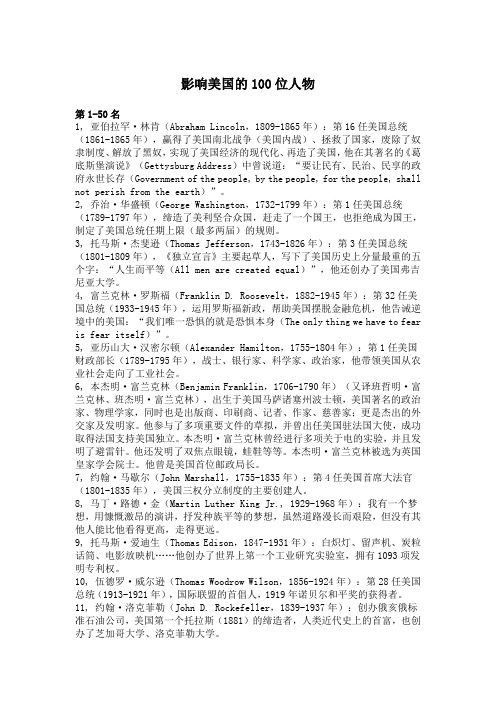
影响美国的100位人物第1-50名1, 亚伯拉罕·林肯(Abraham Lincoln,1809-1865年):第16任美国总统(1861-1865年),赢得了美国南北战争(美国内战)、拯救了国家,废除了奴隶制度、解放了黑奴,实现了美国经济的现代化、再造了美国,他在其著名的《葛底斯堡演说》(Gettysburg Address)中曾说道:“要让民有、民治、民享的政府永世长存(Government of the people, by the people, for the people, shall not perish from the earth)”。
2, 乔治·华盛顿(George Washington,1732-1799年):第1任美国总统(1789-1797年),缔造了美利坚合众国,赶走了一个国王,也拒绝成为国王,制定了美国总统任期上限(最多两届)的规则。
3, 托马斯·杰斐逊(Thomas Jefferson,1743-1826年):第3任美国总统(1801-1809年),《独立宣言》主要起草人,写下了美国历史上分量最重的五个字:“人生而平等(All men are created equal)”,他还创办了美国弗吉尼亚大学。
4, 富兰克林·罗斯福(Franklin D. Roosevelt,1882-1945年):第32任美国总统(1933-1945年),运用罗斯福新政,帮助美国摆脱金融危机,他告诫逆境中的美国:“我们唯一恐惧的就是恐惧本身(The only thing we have to fear is fear itself)”。
5, 亚历山大·汉密尔顿(Alexander Hamilton,1755-1804年):第1任美国财政部长(1789-1795年),战士、银行家、科学家、政治家,他带领美国从农业社会走向了工业社会。
6, 本杰明·富兰克林(Benjamin Franklin,1706-1790年)(又译班哲明·富兰克林、班杰明·富兰克林),出生于美国马萨诸塞州波士顿,美国著名的政治家、物理学家,同时也是出版商、印刷商、记者、作家、慈善家;更是杰出的外交家及发明家。
美国历史最具影响力一百人
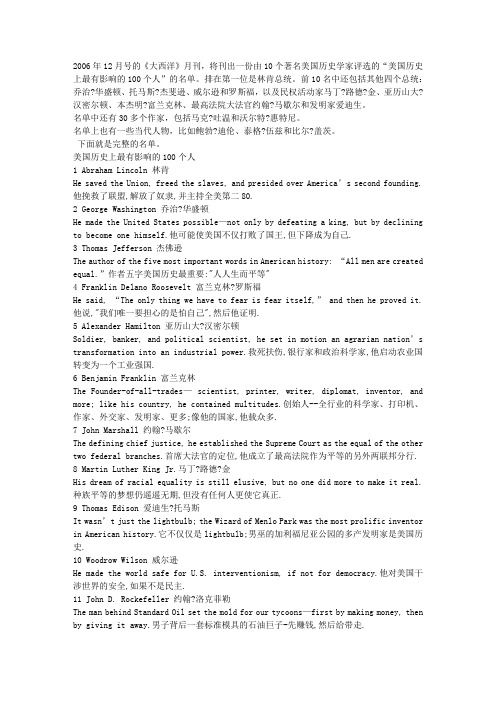
2006年12月号的《大西洋》月刊,将刊出一份由10个著名美国历史学家评选的“美国历史上最有影响的100个人”的名单。
排在第一位是林肯总统。
前10名中还包括其他四个总统:乔治?华盛顿、托马斯?杰斐逊、威尔逊和罗斯福,以及民权活动家马丁?路德?金、亚历山大?汉密尔顿、本杰明?富兰克林、最高法院大法官约翰?马歇尔和发明家爱迪生。
名单中还有30多个作家,包括马克?吐温和沃尔特?惠特尼。
名单上也有一些当代人物,比如鲍勃?迪伦、泰格?伍兹和比尔?盖茨。
下面就是完整的名单。
美国历史上最有影响的100个人1 Abraham Lincoln 林肯He saved the Union, freed the slaves, and presided over America’s second founding.他挽救了联盟,解放了奴隶,并主持全美第二80.2 George Washington 乔治?华盛顿He made the United States possible—not only by defeating a king, but by declining to become one himself.他可能使美国不仅打败了国王,但下降成为自己.3 Thomas Jefferson 杰佛逊The author of the five most important words in American history: “All men are created equal.”作者五字美国历史最重要:"人人生而平等"4 Franklin Delano Roosevelt 富兰克林?罗斯福He said, “The only thing we have to fear is fear itself,” and then he proved it.他说,"我们唯一要担心的是怕自己",然后他证明.5 Alexander Hamilton 亚历山大?汉密尔顿Soldier, banker, and political scientist, he set in motion an agrarian nation’s transformation into an industrial power.救死扶伤,银行家和政治科学家,他启动农业国转变为一个工业强国.6 Benjamin Franklin 富兰克林The Founder-of-all-trades— scientist, printer, writer, diplomat, inventor, and more; like his country, he contained multitudes.创始人--全行业的科学家、打印机、作家、外交家、发明家、更多;像他的国家,他载众多.7 John Marshall 约翰?马歇尔The defining chief justice, he established the Supreme Court as the equal of the other two federal branches.首席大法官的定位,他成立了最高法院作为平等的另外两联邦分行.8 Martin Luther King Jr.马丁?路德?金His dream of racial equality is still elusive, but no one did more to make it real.种族平等的梦想仍遥遥无期,但没有任何人更使它真正.9 Thomas Edison 爱迪生?托马斯It wasn’t just the lightbulb; the Wizard of Menlo Park was the most prolific inventor in American history.它不仅仅是lightbulb;男巫的加利福尼亚公园的多产发明家是美国历史.10 Woodrow Wilson 威尔逊He made the world safe for U.S. interventionism, if not for democracy.他对美国干涉世界的安全,如果不是民主.11 John D. Rockefeller 约翰?洛克菲勒The man behind Standard Oil set the mold for our tycoons—first by making money, then by giving it away.男子背后一套标准模具的石油巨子-先赚钱,然后给带走.12 Ulysses S. Grant 尤利西斯?格兰特He was a poor president, but he was the general Lincoln needed; he also wrote the greatest political memoir in American history.他是一个贫穷的总统,但他总林肯需要;他还写道,在美国历史上最大的政治回忆录.13 James Madison 詹姆斯麦迪逊He fathered the Constitution and wrote the Bill of Rights.他的父亲写信宪法和人权法案.14 Henry Ford福特亨利He gave us the assembly line and the Model T, and sparked America’s love affair with the automobile.他给我们的生产线及094笔,引来美国的汽车情缘.15 Theodore Roosevelt 罗斯福Whether busting trusts or building canals, he embodied the “strenuous life” and blazed a trail for twentieth-century America.是否缉捕或信托大厦运河,他体现了"艰苦生活",走出了一条二十世纪美国.16 Mark Twain 马克吐温Author of our national epic, he was the most unsentimental observer of our national life.民族史诗的作者,他是最冷酷的观察国家生活.17 Ronald Reagan 里根The amiable architect of both the conservative realignment and the Cold War’s end.随和的建筑师都保守重组和冷战的结束.18 Andrew Jackson杰克逊18年家The first great populist: he found America a republic and left it a democracy.第一大民粹:他发现了美洲和左一个民主共和国.19 Thomas Paine 托马斯潘The voice of the American Revolution, and our first great radical.美国革命的声音,我们的第一大急.20 Andrew Carnegie 安德鲁卡内基The original self-made man forged America’s industrial might and became one of the nation’s greatest philanthropists.原来自制男子伪造美国的工业力量,成为全国最大的慈善家.21 Harry Truman 亨利杜鲁门An accidental president, this machine politician ushered in the Atomic Age and then the Cold War.一个偶然,这种机器政治家开创原子能时代,然后冷战.22 Walt Whitman ,惠特曼He sang of America and shaped the country’s conception of itself.他唱得合众国形国观本身.23 Wright Brothers 莱特兄弟They got us all off the ground.大家拿到离地面.24 Alexander Graham Bell 亚历山大格雷厄姆贝尔By inventing the telephone, he opened the age of telecommunications and shrank the world.发明了电话,他开的年龄缩水电信和世界.25 John Adams 约翰亚当斯His leadership made the American Revolution possible; his devotion to republicanism made it succeed.他领导了美国革命;献身共和得很成功.26 Walt Disney 迪士尼The quintessential entertainer-entrepreneur, he wielded unmatched influence over our childhood.艺人精深的企业家,他执掌匹敌影响我们的童年.27 Eli Whitney 惠特曼His gin made cotton king and sustained an empire for slavery.他杜松子酒棉制帝国为国王和持续奴役.28 Dwight Eisenhower 艾森豪威尔He won a war and two elections, and made everybody like Ike.他赢得了一场战争,两次选举中,取得了大家喜欢的IKE.29 Earl Warren 厄尔华伦His Supreme Court transformed American society and bequeathed to us the culture wars.美国最高法院改变其社会留给我们的文化战争.30 Elizabeth Cady Stanton 伊丽莎白卡迪One of the first great American feminists, she fought for social reform and women’s right to vote.一个伟大的美国女性第一,她争取社会改革和妇女选举权.31 Henry Clay 亨利克雷One of America’s greatest legislators and orators, he forged compromises that held off civil war for decades.其中美国最大的立法者和演说,他妥协,举行过十年内战.32 Albert Einstein 爱因斯坦His greatest scientific work was done in Europe, but his humanity earned him undying fame in America.他最大的科学工作都是在欧洲,但他的人性为他赢得不朽的名声在美国. 33 Ralph Waldo Emerson 爱默生The bard of individualism, he relied on himself—and told us all to do the same.巴德的个人主义,他靠的是自己,告诉大家这样做.34 Jonas SalkHis vaccine for polio eradicated one of the world’s worst plagues.他根除小儿麻痹症疫苗是世界上最坏的瘟疫.35 Jackie RobinsonHe broke baseball’s color barrier and embodied integration’s promise.他打破职棒的壁垒,体现彩色一体化的诺言.36 William Jennings Bryan 威廉吉布莱恩“The Great Commoner”lost three presidential elections, but his populism transformed the country."大布衣"失去三个总统选举,但他的民粹主义的转化.37 J. P. Morgan 摩根大通The great financier and banker was the prototype for all the Wall Street barons who followed.大金融家和银行家是所有原型随同华尔街大王.38 Susan B. Anthony 苏珊乙安东尼She was the country’s most eloquent voice for women’s equality under the law.她是我国目前最有力的声音,妇女在法律上平等.39 Rachel Carson卡森雷切尔The author of Silent Spring was godmother to the environmental movement.<寂静的春天>作者是环保运动的教母.40 John Dewey 杜威He sought to make the public school a training ground for democratic life.他力求使公立学校的训练场民主生活.41 Harriet Beecher Stowe 的Harriet格尔斯托Her Uncle Tom’s Cabin inspired a generation of abolitionists and set the stage for civil war.汤姆叔叔的鼓舞了一代舱,并为废奴内战.42 Eleanor Roosevelt 罗斯福She used the first lady’s office and the mass media to become “first lady of the world.”她用第一夫人办公室和大众传媒成为"世界第一夫人"43 W. E. B. DuBois 特约e.乙杜波伊斯One of America’s great intellectuals, he made the “problem of the color line” his life’s work.其中美国的大知识分子,他的"问题的彩色线"一生的工作.44 Lyndon Baines Johnson 贝恩斯约翰逊His brilliance gave us civil-rights laws; his stubbornness gave us Vietnam.他给我们光辉民事权利的法律;他给我们越固执.45 Samuel F. B. Morse 塞缪尔莫尔斯乙六Before the Internet, there was Morse code.在互联网上有莫尔斯码.46 William Lloyd Garrison 威廉劳埃德驻军Through his newspaper, The Liberator , he became the voice of abolition.通过他的报纸,解放者,继任呼声裁撤.47 Frederick Douglass 道格拉斯After escaping from slavery, he pricked the nation’s conscience with an eloquent accounting of its crimes.后逃离奴役,他刺激了民族的良知与辩才核算其罪行.48 Robert Oppenheimer 奥本海默The father of the atomic bomb and the regretful midwife of the nuclear era.原子弹之父的遗憾和助产士的核时代.49 Frederick Law Olmsted 法检欧姆斯德The genius behind New York’s Central Park, he inspired the greening of America’s cities.天才背后的纽约中央公园,他鼓舞了绿化美的城市.50 James K. Polk 詹姆斯悦结论POLKThis one-term president’s Mexican War landgrab gave us California, Texas, and the Southwest.这其中任总统的美墨战争landgrab给加州德克萨斯、西南地区.51 Margaret Sanger 霭桑戈The ardent champion of birth control—and of the sexual freedom that came with it.冠军的殷切节育、性自由而来的.52 Joseph Smith 约瑟夫史密斯The founder of Mormonism, America’s most famous homegrown faith.mormonism创始人、美国最知名的本土信仰.53 Oliver Wendell Holmes Jr. 霍姆斯保守派苦海wendellKnown as “The Great Dissenter,” he wrote Supreme Court opinions that continue to shape American jurisprudence.被称为"伟大的异议",他写的意见,最高法院判例美国继续形状.54 Bill Gates 盖茨The Rockefeller of the Information Age, in business and philanthropy alike.洛克菲勒的信息时代,在商业和慈善事业一样.55 John Quincy Adams 约翰-昆西亚当The Monroe Doctrine’s real author, he set nineteenth-century America’s diplomatic course.门罗主义的真正作者,他提出19世纪美国的外交历程.56 Horace Mann 贺拉斯?曼His tireless advocacy of universal public schooling earned him the title “The Father of American Education.”不知疲倦就学赢得公众宣传普及标题"美国教育之父"57 Robert E. Lee 罗伯特李e.He was a good general but a better symbol, embodying conciliation in defeat.他是一名好美好的象征,但一般体现在调解失败.58 John C. Calhoun 约翰丙卡尔洪The voice of the antebellum South, he was slavery’s most ardent defender.内战前南方的声音,他被奴役的最纯朴的维护者.59 Louis Sullivan沙利文路易The father of architectural modernism, he shaped the defining American building: the skyscraper.现代主义建筑之父,他塑造的界定美国建筑:摩天大楼.60 William Faulkner 福克纳The most gifted chronicler of America’s tormented and fascinating South.最天才日记美国南折磨,引人入胜.61 Samuel Gompers 塞缪尔gompersThe country’s greatest labor organizer, he made the golden age of unions possible.我国最大的劳务组织者,他的黄金时代工会播出.62 William James 威廉詹姆斯The mind behind Pragmatism, America’s most important philosophical school.后面的实用主义态度,美国最重要的哲学学校.63 George Marshall 马歇尔乔治As a general, he organized the American effort in World War II; as a statesman, he rebuilt Western Europe.作为一般,他组织的努力,美国在第二次世界大战;作为一个政治家,他改建西欧.64 Jane Addams 阿珍addamsThe founder of Hull House, she became the secular saint of social work.船体内部的创始人,她成了圣世俗社会工作.65 Henry David Thoreau 亨利大卫梭罗The original American dropout, he has inspired seekers of authenticity for 150 years.原来美洲辍学,他授意求职真实性一百五十年.66 Elvis Presley 猫王The king of rock and roll.摇滚天王. Enough said.够.67 P. T. Barnum 第汤匙barnumThe circus impresario’s taste for spectacle paved the way for blockbuster movies and reality TV.impresario马戏团的口味眼镜铺平风靡一时的电视影片和现实.68 James D. Watson 理丁沃森He codiscovered DNA’s double helix, revealing the code of life to scientists and entrepreneurs alike.他codiscovered的DNA的双螺旋,显现出生命的科学家和企业家实务乐趣.69 James Gordon Bennett 詹姆斯治疗Bennett戈登As the founding publisher of The New York Herald , he invented the modern Americannewspaper.作为创始社长纽约先驱,他发明了美国现代报业.70 Lewis and Clark 刘易斯和克拉克They went west to explore, and millions followed in their wake.他们来到西发掘,并在随后几百万跟随.71 Noah Webster71年诺亚韦伯斯特He didn’t create American English, but his dictionary defined it.他没有创造美国英语,但他的字典定义.72 Sam Walton 萨姆尔登He promised us “Every Day Low Prices,” and we took him up on the offer.他应允"天天低价"的时候,他就代为提供.73 Cyrus McCormick 鲁士和McCormickHis mechanical reaper spelled the end of traditional farming, and the beginning of industrial agriculture.他机械收割结束堆砌传统农业,农业产业初.74 Brigham Young 翰What Joseph Smith founded, Young preserved, leading the Mormons to their promised land.约瑟夫史密斯创立什么,年轻保存,其领导摩门教乐土.75 George Herman “Babe” Ruth 乔治赫尔曼"宝贝"罗思He saved the national pastime in the wake of the Black Sox scandal—and permanently linked sports and celebrity.他挽救了国家在经历了黑色消遣脱硫丑闻--体育界名人和长久联系.76 Frank Lloyd Wright 赖特America’s most significant architect, he was the archetype of the visionary artist at odds with capitalism.美国最重要的建筑师,他是具有远见卓识的艺术家原型触资本主义.77 Betty Friedan 傅瑞She spoke to the discontent of housewives everywhere—and inspired a revolution in gender roles.她不满地到处家庭主妇和启发性别角色的一场革命.78 John Brown 约翰-布朗Whether a hero, a fanatic, or both, he provided the spark for the Civil War.无论英雄,一个狂热,或两者,为他提供了星火内战.79 Louis Armstrong斯特朗路易His talent and charisma took jazz from the cathouses of Storyville to Broadway, television, and beyond.他的才华和魅力,把爵士乐从cathousesstoryville的百老汇、电视及以后.80 William Randolph Hearst 威廉道夫hearstThe press baron who perfected yellow journalism and helped start the Spanish-American War.新闻男爵黄色新闻,帮助他们完善开始美西战争.81 Margaret Mead 霭蜂蜜With Coming of Age in Samoa , she made anthropology relevant—and controversial.年龄在萨摩亚与未来,她作了相关的人类学和争议.82 George Gallup 乔治盖洛普He asked Americans what they thought, and the politicians listened.他要求美国人怎么想、政治家听.83 James Fenimore Cooper 库柏The novels are unreadable, but he was the first great mythologizer of the frontier.小说都不知所云,但他是第一个伟大的mythologizer前沿.84 Thurgood Marshall thurgood马歇尔As a lawyer and a Supreme Court justice, he was the legal architect of the civil-rights revolution.身为律师和最高法院的法官,他是建筑师的民事法律权利革命.85 Ernest Hemingway 海明威His spare style defined American modernism, and his life made machismo a cliché.空暇界定美国现代风格,他的一生作了主义陈词滥调.86 Mary Baker Eddy 玛丽贝克涡She got off her sickbed and founded Christian Science, which promised spiritual healing to all.她下车,她在病床上创立基督教科学,答应全部愈合精神.87 Benjamin Spock 开展SPOCK本杰明With a single book—and a singular approach—he changed American parenting.有一本书和一个奇异的办法,他改变了美国父母.88 Enrico Fermi 费米师EnricoA giant of physics, he helped develop quantum theory and was instrumental in building the atomic bomb.物理学的巨人,他帮助开发量子理论、戮力建设原子弹.89 Walter Lippmann 李普曼The last man who could swing an election with a newspaper column.秋千上的人可以选同一家报纸专栏.90 Jonathan Edwards 乔纳森爱德华Forget the fire and brimstone: his subtle eloquence made him the country’s most influential theologian.忘记火硫磺:他的口才,使他微妙我国最有影响的神学家.91 Lyman Beecher 曼格尔Harriet Beecher Stowe’s clergyman father earned fame as an abolitionist and an evangelist.斯托的Harriet格尔的牧师父亲赢得知名度作为一个传道、废除死刑.92 John Steinbeck 斯坦贝克As the creator of Tom Joad, he chronicled Depression-era misery.由于汤姆joad缔造者,他时序抑郁时代苦难.93 Nat Turner 奈特?特纳He was the most successful rebel slave; his specter would stalk the white South fora century.他是最成功的反叛奴隶;他将秸秆白幽灵南一世纪.94 George Eastman 乔治伊士曼The founder of Kodak democratized photography with his handy rolls of film.柯达民主化与摄影的创始人,他就便卷底片.95 Sam Goldwyn 萨姆goldwynA producer for forty years, he was the first great Hollywood mogul.监制四十年,他第一个大好莱坞巨头.96 Ralph Nader 拉尔夫纳德He made the cars we drive safer; thirty years later, he made George W. Bush the president.他驾驶的轿车上比较安全;30年后,他把布什总统.97 Stephen Foster 斯蒂芬?福斯特America’s first great songwriter, he brought us “O!美国第一大作曲家,他给我们带来的"澳! Susanna” and “My Old Kentucky Home.”susanna"、"我的老肯塔基家."98 Booker T. Washington 布汤匙华盛顿As an educator and a champion of self-help, he tried to lead black America up from slavery.作为一个教育工作者,有冠军自助,他试图从美洲黑铅奴役.99 Richard Nixon 尼克松He broke the New Deal majority, and then broke his presidency on a scandal that still haunts America.他打破了新政席,然后在其总统丑闻爆发,美国仍然挥之不去.100 Herman Melville 赫尔曼梅尔维尔Moby Dick was a flop at the time, but Melville is remembered as the American Shakespeare.白鲸是掉落在当时,不过梅尔维尔是怀念这位美国莎士比亚.。
美国历史上最具影响力的20大人物

1. 乔治-华盛顿(George Washington)乔治-华盛顿是美国首任总统,美国独立战争大陆军总司令。
1789年当选为美国第一任总统,1793年获得连任,在两届任期结束后,他自愿放弃权力不再续任,隐退于弗农山庄园。
由于他扮演了美国独立战争和建国中最重要的角色,故被尊称为“美国国父”,学者们则将他和亚伯拉罕-林肯并列为美国历史上两位最伟大的总统。
2.托马斯-杰斐逊(Thomas.Jefferson)在美国的众多开国元老中,托马斯-杰斐逊无疑是最具有远见的一位。
杰斐逊出生于弗吉尼亚一个富裕家庭,曾就读于威廉与玛丽学院。
1800年竞选总统时,他与阿伦-伯尔所得选举人票数相等,后由众议院选择杰斐逊当总统。
截至目前为止,杰斐逊为唯一担任过美国副总统后又选上总统,且任满两个任期者。
作为《独立宣言》的主要起草人,杰斐逊最的成就无疑是《独立宣言》。
自1776年以来,《独立宣言》中所体现的原则就一直为世人所传颂。
美国的改革家们,不论是出于什么动机,不论是为了废除奴隶制,禁止种族隔离或是要提高公民的权利,都会向公众提到“人人生而平等”(All men are created equal)这一名言。
除此之外,杰斐逊还是一个著名的发明家,他兴趣十分广泛,且喜欢自己想出一些新鲜玩艺。
比如,杰斐逊家客厅的双开大门,两扇门会同步转动开闭,是因为他自己在地板下安装了连动两个门轴的装置。
地下室厨房里做好的饭菜,可以通过升降梯送到楼上餐厅,这个我们现在在饭店里司空见惯的装置,却是由杰斐逊第一个设计出来的。
3. 萨卡加维亚(Sacagawea)、梅里韦瑟-刘易斯(Meriwether Lewis)和威廉-克拉克(William Clark)萨卡加维亚、梅里韦瑟-刘易斯和威廉-克拉克这三人都是美国国内首次横越大陆西抵太平洋沿岸的往返考察活动的队员,其中领队为美国陆军的刘易斯上尉和威克拉克少尉为领队,该活动是由杰斐逊总统发起。
当时,在加拿大的英国人和仍然占据着得克萨斯以及西南部地区的西班牙人,从来没有对路易斯安那死心,它们煽动当地的印第安人对抗进入这一地区的美国移民。
美国名人100
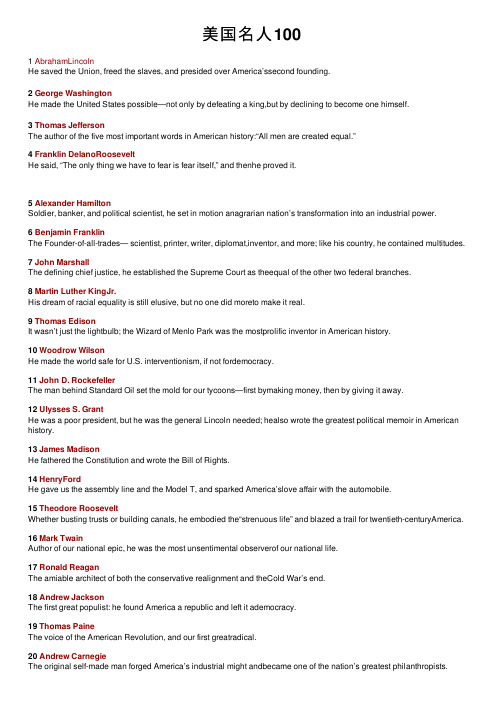
美国名⼈1001 AbrahamLincolnHe saved the Union, freed the slaves, and presided over America’ssecond founding.2 George WashingtonHe made the United States possible—not only by defeating a king,but by declining to become one himself.3 Thomas JeffersonThe author of the five most important words in American history:“All men are created equal.”4 Franklin DelanoRooseveltHe said, “The only thing we have to fear is fear itself,” and thenhe proved it.5 Alexander HamiltonSoldier, banker, and political scientist, he set in motion anagrarian nation’s transformation into an industrial power.6 Benjamin FranklinThe Founder-of-all-trades— scientist, printer, writer, diplomat,inventor, and more; like his country, he contained multitudes.7 John MarshallThe defining chief justice, he established the Supreme Court as theequal of the other two federal branches.8 Martin Luther KingJr.His dream of racial equality is still elusive, but no one did moreto make it real.9 Thomas EdisonIt wasn’t just the lightbulb; the Wizard of Menlo Park was the mostprolific inventor in American history.10 Woodrow WilsonHe made the world safe for U.S. interventionism, if not fordemocracy.11 John D. RockefellerThe man behind Standard Oil set the mold for our tycoons—first bymaking money, then by giving it away.12 Ulysses S. GrantHe was a poor president, but he was the general Lincoln needed; healso wrote the greatest political memoir in American history.13 James MadisonHe fathered the Constitution and wrote the Bill of Rights.14 HenryFordHe gave us the assembly line and the Model T, and sparked America’slove affair with the automobile.15 Theodore RooseveltWhether busting trusts or building canals, he embodied the“strenuous life” and blazed a trail for twentieth-centuryAmerica.16 Mark TwainAuthor of our national epic, he was the most unsentimental observerof our national life.17 Ronald ReaganThe amiable architect of both the conservative realignment and theCold War’s end.18 Andrew JacksonThe first great populist: he found America a republic and left it ademocracy.19 Thomas PaineThe voice of the American Revolution, and our first greatradical.20 Andrew CarnegieThe original self-made man forged America’s industrial might andbecame one of the nation’s greatest philanthropists.21 Harry TrumanAn accidental president, this machine politician ushered in theAtomic Age and then the Cold War.22 WaltWhitmanHe sang of America and shaped the country’s conception ofitself.23 Wright BrothersThey got us all off the ground.24 Alexander Graham BellBy inventing the telephone, he opened the age of telecommunicationsand shrank the world.25 John AdamsHis leadership made the American Revolution possible; his devotionto republicanism made it succeed.26 Walt DisneyThe quintessential entertainer-entrepreneur, he wielded unmatchedinfluence over our childhood.27 Eli WhitneyHis gin made cotton king and sustained an empire for slavery.28 DwightEisenhowerHe won a war and two elections, and made everybody like Ike.29 Earl WarrenHis Supreme Court transformed American society and bequeathed to usthe culture wars.30 Elizabeth Cady StantonOne of the first great American feminists, she fought for socialreform and women’s right to vote.31 Henry ClayOne of America’s greatest legislators and orators, he forgedcompromises that held off civil war for decades.32 Albert EinsteinHis greatest scientific work was done in Europe, but his humanityearned him undying fame in America.33 Ralph Waldo EmersonThe bard of individualism, he relied on himself—and told us all todo the same.34 Jonas SalkHis vaccine for polio eradicated one of the world’s worstplagues.35 Jackie RobinsonHe broke baseball’s color barrier and embodied integration’spromise.36 William Jennings Bryan“The Great Commoner” lost three presidential elections, but hispopulism transformed the country.37 J. P. MorganThe great financier and banker was the prototype for all the WallStreet barons who followed.38 Susan B.AnthonyShe was the country’s most eloquent voice for women’s equalityunder the law.39 Rachel CarsonThe author of Silent Spring was godmother to theenvironmental movement.40 John DeweyHe sought to make the public school a training ground fordemocratic life.41 Harriet BeecherStoweHer Uncle Tom’s Cabin inspired a generation of abolitionistsand set the stage for civil war.42 Eleanor RooseveltShe used the first lady’s office and the mass media to become“first lady of the world.”43 W. E. B.DuBoisOne of America’s great intellectuals, he made the “problem of thecolor line” his life’s work.44 Lyndon BainesJohnsonHis brilliance gave us civil-rights laws; his stubbornness gave usVietnam.45 Samuel F. B. MorseBefore the Internet, there was Morse code.46 William LloydGarrisonThrough his newspaper, The Liberator, he became the voice ofabolition.47 Frederick DouglassAfter escaping from slavery, he pricked the nation’s consciencewith an eloquent accounting of its crimes.48 Robert OppenheimerThe father of the atomic bomb and the regretful midwife of thenuclear era.49 Frederick LawOlmstedThe genius behind New York’s Central Park, he inspired the greeningof America’s cities.50 James K. PolkThis one-term president’s Mexican War landgrab gave us California,Texas, and the Southwest.51 Margaret SangerThe ardent champion of birth control—and of the sexual freedom thatcame with it.52 Joseph SmithThe founder of Mormonism, America’s most famous homegrownfaith.53 Oliver Wendell HolmesJr.Known as “The Great Dissenter,” he wrote Supreme Court opinionsthat continue to shape American jurisprudence.54 BillGatesThe Rockefeller of the Information Age, in business andphilanthropy alike.55 John Quincy AdamsThe Monroe Doctrine’s real author, he set nineteenth-centuryAmerica’s diplomatic course.56 Horace MannHis tireless advocacy of universal public schooling earned him thetitle “The Father of American Education.”57 Robert E. LeeHe was a good general but a better symbol, embodying conciliationin defeat.58 John C.CalhounThe voice of the antebellum South, he was slavery’s most ardentdefender.59 Louis SullivanThe father of architectural modernism, he shaped the definingAmerican building: the skyscraper.60 William FaulknerThe most gifted chronicler of America’s tormented and fascinatingSouth.61 SamuelGompersThe country’s greatest labor organizer, he made the golden age ofunions possible.62 William JamesThe mind behind Pragmatism, America’s most important philosophicalschool.63 George MarshallAs a general, he organized the American effort in World War II; asa statesman, he rebuilt Western Europe.64 Jane AddamsThe founder of Hull House, she became the secular saint of socialwork.65 Henry David ThoreauThe original American dropout, he has inspired seekers ofauthenticity for 150 years.66 ElvisPresleyThe king of rock and roll. Enough said.67 P. T. BarnumThe circus impresario’s taste for spectacle paved the way forblockbuster movies and reality TV.68 James D. WatsonHe codiscovered DNA’s double helix, revealing the code of life toscientists and entrepreneurs alike.69 James GordonBennettAs the founding publisher of The New York Herald, heinvented the modern American newspaper.70 Lewis and ClarkThey went west to explore, and millions followed in their wake.71 Noah WebsterHe didn’t create American English, but his dictionary definedit.72 SamWaltonHe promised us “Every Day Low Prices,” and we took him up on theoffer.73 Cyrus McCormickHis mechanical reaper spelled the end of traditional farming, andthe beginning of industrial agriculture.74 Brigham YoungWhat Joseph Smith founded, Young preserved, leading the Mormons totheir promised land.75 George Herman“Babe” RuthHe saved the national pastime in the wake of the Black Soxscandal—and permanently linked sports and celebrity.76 Frank Lloyd WrightAmerica’s most significant architect, he was the archetype of thevisionary artist at odds with capitalism.77 BettyFriedanShe spoke to the discontent of housewives everywhere—and inspired arevolution in gender roles.78 John BrownWhether a hero, a fanatic, or both, he provided the spark for theCivil War.79 Louis ArmstrongHis talent and charisma took jazz from the cathouses of Storyvilleto Broadway, television, and beyond.80 William RandolphHearstThe press baron who perfected yellow journalism and helped startthe Spanish-American War.81 Margaret MeadWith Coming of Age in Samoa, she made anthropologyrelevant—and controversial.82 George GallupHe asked Americans what they thought, and the politicianslistened.83 James FenimoreCooperThe novels are unreadable, but he was the first great mythologizerof the frontier.84 Thurgood MarshallAs a lawyer and a Supreme Court justice, he was the legal architectof the civil-rights revolution.85 Ernest HemingwayHis spare style defined American modernism, and his life mademachismo a cliché.86 Mary Baker EddyShe got off her sickbed and founded Christian Science, whichpromised spiritual healing to all.87 Benjamin SpockWith a single book—and a singular approach—he changed Americanparenting.88 Enrico FermiA giant of physics, he helped develop quantum theory and wasinstrumental in building the atomic bomb.89 Walter LippmannThe last man who could swing an election with a newspapercolumn.90 Jonathan EdwardsForget the fire and brimstone: his subtle eloquence made him thecountry’s most influential theologian.91 Lyman BeecherHarriet Beecher Stowe’s clergyman father earned fame as anabolitionist and an evangelist.92 JohnSteinbeckAs the creator of Tom Joad, he chronicled Depression-eramisery.93 Nat TurnerHe was the most successful rebel slave; his specter would stalk thewhite South for a century.94 George EastmanThe founder of Kodak democratized photography with his handy rollsof film.95 Sam GoldwynA producer for forty years, he was the first great Hollywoodmogul.96 Ralph NaderHe made the cars we drive safer; thirty years later, he made GeorgeW. Bush the president.97 Stephen FosterAmerica’s first great songwriter, he brought us “O! Susanna” and“My Old Kentucky Home.”98 Booker T.WashingtonAs an educator and a champion of self-help, he tried to lead blackAmerica up from slavery.99 Richard NixonHe broke the New Deal majority, and then broke his presidency on ascandal that still haunts America. 100 Herman MelvilleMoby Dick was a flop at the time, but Melville is rememberedas the American Shakespeare.。
世界名人林肯的简介及故事_名人故事素材
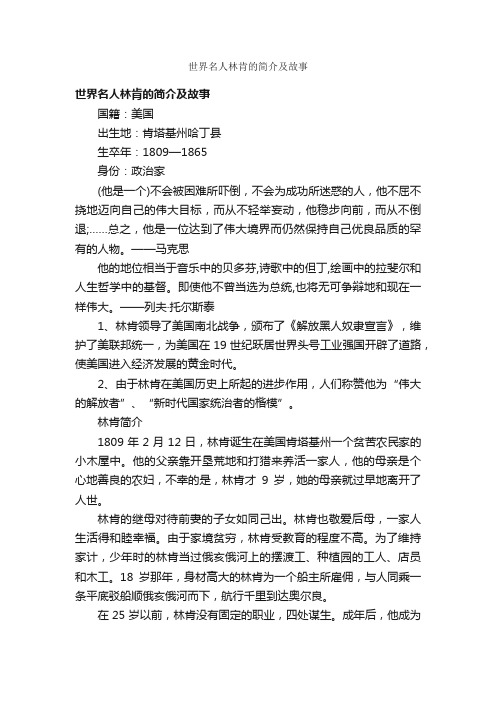
世界名人林肯的简介及故事世界名人林肯的简介及故事国籍:美国出生地:肯塔基州哈丁县生卒年:1809—1865身份:政治家(他是一个)不会被困难所吓倒,不会为成功所迷惑的人,他不屈不挠地迈向自己的伟大目标,而从不轻举妄动,他稳步向前,而从不倒退;……总之,他是一位达到了伟大境界而仍然保持自己优良品质的罕有的人物。
——马克思他的地位相当于音乐中的贝多芬,诗歌中的但丁,绘画中的拉斐尔和人生哲学中的基督。
即使他不曾当选为总统,也将无可争辩地和现在一样伟大。
——列夫·托尔斯泰1、林肯领导了美国南北战争,颁布了《解放黑人奴隶宣言》,维护了美联邦统一,为美国在19世纪跃居世界头号工业强国开辟了道路,使美国进入经济发展的黄金时代。
2、由于林肯在美国历史上所起的进步作用,人们称赞他为“伟大的解放者”、“新时代国家统治者的楷模”。
林肯简介1809年2月12日,林肯诞生在美国肯塔基州一个贫苦农民家的小木屋中。
他的父亲靠开垦荒地和打猎来养活一家人,他的母亲是个心地善良的农妇,不幸的是,林肯才9岁,她的母亲就过早地离开了人世。
林肯的继母对待前妻的子女如同己出。
林肯也敬爱后母,一家人生活得和睦幸福。
由于家境贫穷,林肯受教育的程度不高。
为了维持家计,少年时的林肯当过俄亥俄河上的摆渡工、种植园的工人、店员和木工。
18岁那年,身材高大的林肯为一个船主所雇佣,与人同乘一条平底驳船顺俄亥俄河而下,航行千里到达奥尔良。
在25岁以前,林肯没有固定的职业,四处谋生。
成年后,他成为一名当地土地测绘员,因精通测量和计算,常被人们请去解决地界纠纷。
在艰苦的劳作之余,林肯始终是一个热爱读书的青年,他夜读的灯火总要闪烁到很晚很晚。
在青年时代,林肯通读了莎士比亚的全部着作,读了《美国历史》,还读了许多历史和文学书籍。
他通过自学使自己成为一个博学而充满智慧的人。
1832年,州议会进行竞选活动,林肯所在的地区,大家一致认为只有他是最受大家爱戴又最被大家信任的人,便建议他去参加竞选。
美国100位历史名人榜(44):Lyndon Baines Johnson
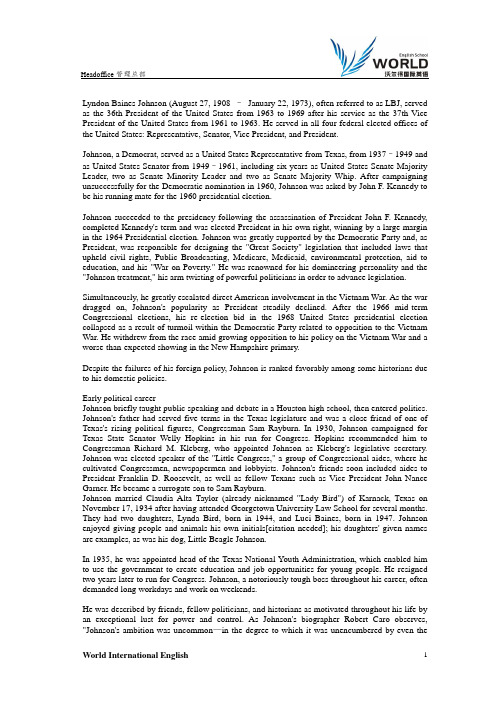
Headoffice管理总部Lyndon Baines Johnson (August 27, 1908 –January 22, 1973), often referred to as LBJ, served as the 36th President of the United States from 1963 to 1969 after his service as the 37th Vice President of the United States from 1961 to 1963. He served in all four federal elected offices of the United States: Representative, Senator, Vice President, and President.Johnson, a Democrat, served as a United States Representative from Texas, from 1937–1949 and as United States Senator from 1949–1961, including six years as United States Senate Majority Leader, two as Senate Minority Leader and two as Senate Majority Whip. After campaigning unsuccessfully for the Democratic nomination in 1960, Johnson was asked by John F. Kennedy to be his running mate for the 1960 presidential election.Johnson succeeded to the presidency following the assassination of President John F. Kennedy, completed Kennedy's term and was elected President in his own right, winning by a large margin in the 1964 Presidential election. Johnson was greatly supported by the Democratic Party and, as President, was responsible for designing the "Great Society" legislation that included laws that upheld civil rights, Public Broadcasting, Medicare, Medicaid, environmental protection, aid to education, and his "War on Poverty." He was renowned for his domineering personality and the "Johnson treatment," his arm twisting of powerful politicians in order to advance legislation. Simultaneously, he greatly escalated direct American involvement in the Vietnam War. As the war dragged on, Johnson's popularity as President steadily declined. After the 1966 mid-term Congressional elections, his re-election bid in the 1968 United States presidential election collapsed as a result of turmoil within the Democratic Party related to opposition to the Vietnam War. He withdrew from the race amid growing opposition to his policy on the Vietnam War and a worse-than-expected showing in the New Hampshire primary.Despite the failures of his foreign policy, Johnson is ranked favorably among some historians due to his domestic policies.Early political careerJohnson briefly taught public speaking and debate in a Houston high school, then entered politics. Johnson's father had served five terms in the Texas legislature and was a close friend of one of Texas's rising political figures, Congressman Sam Rayburn. In 1930, Johnson campaigned for Texas State Senator Welly Hopkins in his run for Congress. Hopkins recommended him to Congressman Richard M. Kleberg, who appointed Johnson as Kleberg's legislative secretary. Johnson was elected speaker of the "Little Congress," a group of Congressional aides, where he cultivated Congressmen, newspapermen and lobbyists. Johnson's friends soon included aides to President Franklin D. Roosevelt, as well as fellow Texans such as Vice President John Nance Garner. He became a surrogate son to Sam Rayburn.Johnson married Claudia Alta Taylor (already nicknamed "Lady Bird") of Karnack, Texas on November 17, 1934 after having attended Georgetown University Law School for several months. They had two daughters, Lynda Bird, born in 1944, and Luci Baines, born in 1947. Johnson enjoyed giving people and animals his own initials[citation needed]; his daughters' given names are examples, as was his dog, Little Beagle Johnson.In 1935, he was appointed head of the Texas National Youth Administration, which enabled him to use the government to create education and job opportunities for young people. He resigned two years later to run for Congress. Johnson, a notoriously tough boss throughout his career, often demanded long workdays and work on weekends.He was described by friends, fellow politicians, and historians as motivated throughout his life by an exceptional lust for power and control. As Johnson's biographer Robert Caro observes, "Johnson's ambition was uncommon—in the degree to which it was unencumbered by even theHeadoffice管理总部slightest excess weight of ideology, of philosophy, of principles, of beliefs."Senate years1948 contested electionIn 1948, Johnson again ran for the Senate and won. This election was highly controversial: a three-way Democratic Party primary saw Johnson facing a well-known former governor, Coke Stevenson; and a third candidate. Johnson drew crowds to fairgrounds with his rented helicopter dubbed "The Johnson City Windmill". He raised money to flood the state with campaign circulars, and won over conservatives by voting for the Taft-Hartley act (curbing union power) as well as by criticizing unions himself.Stevenson came in first, but lacked a majority, so a runoff was held. Johnson campaigned even harder this time around, while Stevenson's efforts were surprisingly poor. As the two candidates see-sawed for the lead, the runoff count took a week. The Democratic State Central Committee (not the state, because the matter was a party primary) handled the count, and it finally announced that Johnson had won by 87 votes. By a majority of one member (29-28) the committee voted to certify Johnson's nomination, with the last vote cast on Johnson's behalf by Temple (Texas) publisher Frank W. Mayborn, who rushed back to Texas from a business trip in Nashville.There were many allegations of fraud on both sides. Thus, one writer alleges that Johnson's campaign manager, future Texas governor John B. Connally, was connected with 202 ballots in Precinct 13 in Jim Wells County that had curiously been cast in alphabetical order and all just at the close of polling. (All of the people whose names appeared on the ballots were found to have been dead on election day.) Robert Caro argued in his 1989 book that Johnson had stolen the election in Jim Wells County, and other counties in South Texas, as well as rigging 10,000 ballots in Bexar County alone. A judge, Luis Salas, said in 1977 that he had certified 202 fraudulent ballots for Johnson.The state Democratic convention upheld Johnson. Stevenson went to court, but —with timely help from his friend Abe Fortas —Johnson prevailed. Johnson was elected senator in November, and went to Washington, D.C. tagged with the ironic label "Landslide Lyndon," which he often used deprecatingly to refer to himself.Freshman senatorOnce in the Senate, Johnson was known among his colleagues for his highly successful "courtships" of older senators, especially Senator Richard Russell, patrician leader of the Conservative coalition and arguably the most powerful man in the Senate. Johnson proceeded to gain Russell's favor in the same way that he had "courted" Speaker Sam Rayburn and gained his crucial support in the House.Johnson was appointed to the Senate Armed Services Committee, and later in 1950, he helped create the Preparedness Investigating Subcommittee. Johnson became its chairman and conducted investigations of defense costs and efficiency. These investigations tended to dig out old forgotten investigations and demand actions that were already being taken by the Truman Administration, although it can be said that the committee's investigations caused the changes. However, Johnson's brilliant handling of the press, the efficiency with which his committee issued new reports, and the fact that he ensured every report was endorsed unanimously by the committee all brought him headlines and national attention.Johnson used his political influence in the Senate to receive broadcast licenses from the Federal Communications Commission in his wife's name.In 1951, Johnson was chosen as Senate Majority Whip under a new Majority Leader, ErnestHeadoffice管理总部McFarland of Arizona, and served from 1951 to 1953Senate Democratic leaderSenate Desk X, used by all Democratic leaders, including Johnson, since Joseph Taylor RobinsonIn the 1952 general election Republicans won a majority in both House and Senate. Among defeated Democrats that year was McFarland, who lost to then-little-known Barry Goldwater, Johnson's future presidential opponent.In January 1953, Johnson was chosen by his fellow Democrats to be the minority leader. Thus, he became the least senior Senator ever elected to this position, and one of the least senior party leaders in the history of the Senate. The whip is usually first in line to replace party leader (e.g., most recently whip Harry Reid became Senate Minority Leader after Tom Daschle's defeat).One of his first actions was to eliminate the seniority system in appointment to a committee, while retaining it in terms of chairmanships. In the 1954 election, Johnson was re-elected to the Senate, and since the Democrats won the majority in the Senate, Johnson became majority leader. Former majority leader, William Knowland was elected minority leader. Johnson's duties were to schedule legislation and help pass measures favored by the Democrats. Johnson, Rayburn and President Dwight D. Eisenhower worked smoothly together in passing Eisenhower's domestic and foreign agenda. As Majority Leader, Johnson was responsible for passage of the Civil Rights Act of 1957, the first civil rights legislation passed by the Senate since Reconstruction.Johnson gives "The Treatment" to 90-year-old Rhode Island Senator Theodore F. Green in 1957Historians Caro and Dallek consider Lyndon Johnson the most effective Senate majority leader in history. He was unusually proficient at gathering information. One biographer suggests he was "the greatest intelligence gatherer Washington has ever known", discovering exactly where every Senator stood, his philosophy and prejudices, his strengths and weaknesses, and what it took to break him. Robert Baker claimed that Johnson would occasionally send senators on NATO trips in order to avoid their dissenting votes. Central to Johnson's control was "The Treatment", described by two journalists:The Treatment could last ten minutes or four hours. It came, enveloping its target, at the Johnson Ranch swimming pool, in one of Johnson's offices, in the Senate cloakroom, on the floor of the Senate itself —wherever Johnson might find a fellow Senator within his reach.Its tone could be supplication, accusation, cajolery, exuberance, scorn, tears, complaint and the hint of threat. It was all of these together. It ran the gamut of human emotions. Its velocity was breathtaking, and it was all in one direction. Interjections from the target were rare. Johnson anticipated them before they could be spoken. He moved in close, his face a scant millimeter from his target, his eyes widening and narrowing, his eyebrows rising and falling. From his pockets poured clippings, memos, statistics. Mimicry, humor, and the genius of analogy made The Treatment an almost hypnotic experience and rendered the target stunned and helpless.。
亚伯拉罕林肯美国历史上的伟大领袖

亚伯拉罕林肯美国历史上的伟大领袖亚伯拉罕·林肯:美国历史上的伟大领袖亚伯拉罕·林肯(Abraham Lincoln)是美国历史上一位备受尊敬的伟大领袖。
他以其卓越的领导才能和深思熟虑的决策而赢得了人们的赞誉。
在林肯的领导下,美国从内乱走向团结,废除了奴隶制,并保护了国家的统一。
通过林肯的勇气、智慧和坚定信念,他书写了美国历史上新的篇章。
一、童年与早年经历亚伯拉罕·林肯于1809年2月12日出生在肯塔基州的一个贫困家庭。
他的家人是农民,生活非常艰苦。
尽管如此,林肯依然勤奋好学,并从小展现出了出色的智慧和领导能力。
在他成长的过程中,家庭的艰辛生活和当时社会的不公平现象深深地影响了他,激发了他对正义和平等的追求。
二、政治生涯的起步林肯在1834年进入了伊利诺伊州议会,开始了他的政治生涯。
在此期间,他积极推动改革,并关注社会的不平等现象。
林肯坚信反对奴隶制和保护个人自由的重要性,他对于这一问题的关注逐渐成为他政治生涯的核心。
三、奴隶制的废除林肯当选为美国第16任总统后,他的思想和领导力得到了全面发挥。
他认识到奴隶制是社会不正义的一个根源,并决心推动废除这一制度。
因此,他领导制定并签署了《解放奴隶宣言》,这一里程碑的法案为奴隶解放争取了基本权益和自由。
林肯的坚定立场和领导能力在奴隶制问题上起到了至关重要的作用。
四、美国内战与团结林肯总统的任期正值美国内战时期,国家分裂的危机给国家和人民带来了巨大的压力。
林肯通过出色的战略决策和有效的领导能力,成功地将北方各州团结起来,保护了国家的统一。
他在困难时期展现出来的智慧和勇气,使得国家在战后得以重新激活并重新建设。
五、遗产与影响亚伯拉罕·林肯是美国历史上最重要的领袖之一。
他不仅终结了奴隶制,也确保了国家的统一。
他的领导和决策能力为后世的政治家们树立了榜样。
林肯的演讲和写作也留下了深刻的印象,其中最著名的莫过于《获得新生的自由之宣言》。
美军上将名录
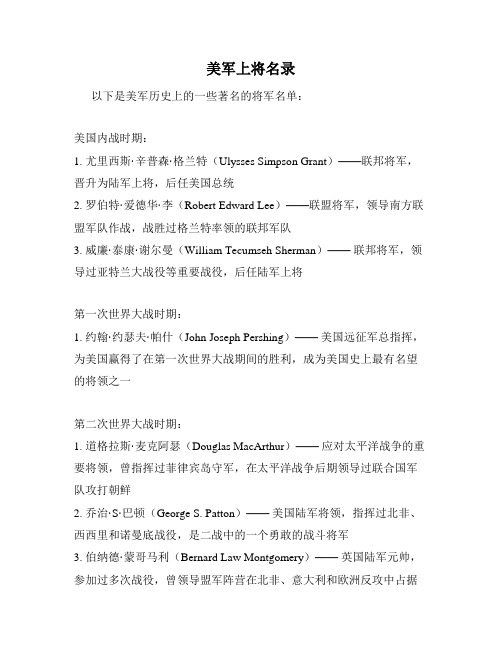
美军上将名录以下是美军历史上的一些著名的将军名单:美国内战时期:1. 尤里西斯·辛普森·格兰特(Ulysses Simpson Grant)——联邦将军,晋升为陆军上将,后任美国总统2. 罗伯特·爱德华·李(Robert Edward Lee)——联盟将军,领导南方联盟军队作战,战胜过格兰特率领的联邦军队3. 威廉·泰康·谢尔曼(William Tecumseh Sherman)——联邦将军,领导过亚特兰大战役等重要战役,后任陆军上将第一次世界大战时期:1. 约翰·约瑟夫·帕什(John Joseph Pershing)——美国远征军总指挥,为美国赢得了在第一次世界大战期间的胜利,成为美国史上最有名望的将领之一第二次世界大战时期:1. 道格拉斯·麦克阿瑟(Douglas MacArthur)——应对太平洋战争的重要将领,曾指挥过菲律宾岛守军,在太平洋战争后期领导过联合国军队攻打朝鲜2. 乔治·S·巴顿(George S. Patton)——美国陆军将领,指挥过北非、西西里和诺曼底战役,是二战中的一个勇敢的战斗将军3. 伯纳德·蒙哥马利(Bernard Law Montgomery)——英国陆军元帅,参加过多次战役,曾领导盟军阵营在北非、意大利和欧洲反攻中占据重要地位现代:1. 艾兹雷尔·“布兹”·颂德(H. Norman Schwarzkopf)——海湾战争时期的美国将领,指挥着盟军阵营的士兵打败了伊拉克的领导人萨达姆·侯赛因。
2. 科林·鲍威尔(Colin Powell)——曾经的联合参谋部主席,也是首位非裔美国人晋升到陆军四星将军,后执掌国务卿职位。
3. 丹尼斯·J·雷奇(Dennis J. Reimer)——担任过联合参谋部主席的美国陆军将领,曾参加越南和海湾战争,并在1995年成为第33任陆军参谋长。
亚伯拉罕林肯美国历史上最伟大的总统之一
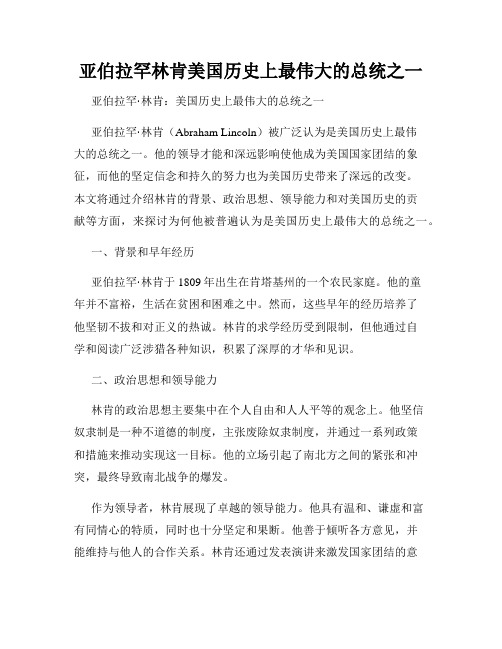
亚伯拉罕林肯美国历史上最伟大的总统之一亚伯拉罕·林肯:美国历史上最伟大的总统之一亚伯拉罕·林肯(Abraham Lincoln)被广泛认为是美国历史上最伟大的总统之一。
他的领导才能和深远影响使他成为美国国家团结的象征,而他的坚定信念和持久的努力也为美国历史带来了深远的改变。
本文将通过介绍林肯的背景、政治思想、领导能力和对美国历史的贡献等方面,来探讨为何他被普遍认为是美国历史上最伟大的总统之一。
一、背景和早年经历亚伯拉罕·林肯于1809年出生在肯塔基州的一个农民家庭。
他的童年并不富裕,生活在贫困和困难之中。
然而,这些早年的经历培养了他坚韧不拔和对正义的热诚。
林肯的求学经历受到限制,但他通过自学和阅读广泛涉猎各种知识,积累了深厚的才华和见识。
二、政治思想和领导能力林肯的政治思想主要集中在个人自由和人人平等的观念上。
他坚信奴隶制是一种不道德的制度,主张废除奴隶制度,并通过一系列政策和措施来推动实现这一目标。
他的立场引起了南北方之间的紧张和冲突,最终导致南北战争的爆发。
作为领导者,林肯展现了卓越的领导能力。
他具有温和、谦虚和富有同情心的特质,同时也十分坚定和果断。
他善于倾听各方意见,并能维持与他人的合作关系。
林肯还通过发表演讲来激发国家团结的意识,并鼓舞人们为实现美国梦而奋斗。
他的领导风格和人格魅力赢得了人民的尊重和支持。
三、林肯对美国历史的贡献林肯的最重要的功绩之一是他在南北战争期间的领导。
他坚定地保护联邦的完整性,并领导北方取得最终的胜利。
他签署了《解放黑奴宣言》,宣布所有被奴役的黑人从那一刻开始自由。
这一举措不仅结束了奴隶制,也加速了南方经济和社会结构的转型。
林肯还领导通过了《美国宪法第13修正案》,废除了奴隶制,并且倡导重建南方的努力。
他致力于实现和解、宽容和团结,促进战后的国家重建。
尽管林肯在南北战争结束后不久遇刺身亡,他的努力为未来美国的统一和繁荣奠定了基础。
四、影响和遗产亚伯拉罕·林肯的才能和领导使他成为了一个标志性的历史人物。
美国的著名二战将领

美国的著名二战将领二战期间,世界各国的军事将领发挥了重要的作用,为他们所在的国家取得了胜利,保卫了世界和平。
美国作为二战的重要参战国之一,有许多著名的将领在战争中表现出色。
本文将介绍几位美国著名的二战将领,他们的英勇事迹和对战争胜利的贡献。
1. 道格拉斯·麦克阿瑟(Douglas MacArthur)道格拉斯·麦克阿瑟将军是美国军队在二战中最重要的将领之一。
他曾在太平洋战场指挥作战,并在菲律宾战役中表现出色。
他的指挥和领导能力被广泛认可,被誉为“麦克阿瑟将军在任何情况下,总能找到方法来击败敌人”。
2. 乔治·巴顿(George Patton)乔治·巴顿将军是美国陆军的杰出指挥官,他以其激情和战术才能而闻名。
巴顿将军领导的第三装甲师在西欧战场上有着重要的作用。
他在诺曼底登陆后的战役中发挥着至关重要的作用,将敌军击溃,促使盟军取得了重要的进展。
3. 威廉·哈尔西(William Halsey)威廉·哈尔西将军是美国海军在二战中的重要将领之一。
他指挥下的第三舰队在太平洋战场上享有盛誉。
他领导的舰队参与了许多重要战役,包括所罗门群岛战役和关岛战役等。
他的勇气和智慧在战争中起到了重要的作用,对于太平洋战场的胜利贡献巨大。
4. 尤利西斯·格兰特(Ulysses S. Grant)尤利西斯·格兰特将军是美国内战时期的将领,但他的领导才能和战略眼光在二战中仍然有很大的影响。
作为美国陆军的将领,格兰特以他对战争的洞察力和灵活性而闻名。
他在军事指挥和战略方面的卓越能力被广泛认可,对于美国在二战中的胜利起到了重要的作用。
5. 乔治·马歇尔(George Marshall)乔治·马歇尔将军是美国陆军的重要将领之一,也是二战期间最有影响力的指挥官之一。
作为陆军参谋长,他负责协调和指挥美军的战略计划。
他的决断和领导能力被广泛认可,对于盟军最终在战争中取得胜利发挥了重要作用。
美国百名人

她和各地不满的家庭主妇交谈,激起了一场性别地位的革命。
78约翰·布朗
不论是英雄、狂热分子或两者兼而有之,他都给日后的内战埋下了一颗种子。
79路易斯·阿姆斯特朗
他的个人魅力把爵士乐带到了从新奥尔良的妓院到纽约的百老汇,从电视到更广阔的天地。
80威廉·伦道夫·赫斯特
他是出版巨头,他把耸人听闻的办报风格发挥的淋漓尽致,他也间接促成了美西战争的爆发。
16马克·吐温
美国史诗的作者,美国生活最冷静的观察者。
17罗纳德·里根
保守派回归和冷战结束的和蔼的倡导者。
18安德鲁·杰克逊
第一个伟大的平民主义者,他在这个共和制国家实行了民主政治。
19托马斯·潘恩
他发出了美国革命的声音,他也是第一个伟大的激进分子。
20安德鲁·卡内基
一个与众不同的白手起家的人把美国打造成了钢铁强国,他也是最伟大的慈善家之一。
1亚伯拉罕·林肯
他挽救了联邦,解放了奴隶,重建了美国。
2乔治·华盛顿
他不仅打败了一个国王,自己也拒绝成为一个国王式的总统,由此成就了今日之美国。
3托马斯·杰斐逊
他写下了美国历史上最重要的六个字“人人生而平等”。
4富兰克林·德拉诺·罗斯福
他用行动证明了他那句广为人知的话“惟一值得我们害怕的就是害怕本身”。
31亨利·克莱
美国最伟大的立法者和演讲家,他的妥协法案使内战推迟了几十年。
32艾伯特·爱因斯坦
在欧洲他成就了伟大的事业,在美国他赢得了不朽的名声。
33拉尔夫·沃尔多·爱默生
重视个人体验的诗人,他告诉我们所有人都要信赖自我。
34乔纳斯·索尔克
- 1、下载文档前请自行甄别文档内容的完整性,平台不提供额外的编辑、内容补充、找答案等附加服务。
- 2、"仅部分预览"的文档,不可在线预览部分如存在完整性等问题,可反馈申请退款(可完整预览的文档不适用该条件!)。
- 3、如文档侵犯您的权益,请联系客服反馈,我们会尽快为您处理(人工客服工作时间:9:00-18:30)。
Headoffice管理总部Ulysses S. Grant born Hiram Ulysses Grant (April 27, 1822–July 23, 1885) was the 18th President of the United States (1869–77) as well as military commander during the Civil War and post-war Reconstruction periods. Under the command of Grant, the Union Army defeated the Confederate military and ended the Confederate States of America. His image as a war hero was tarnished by corruption scandals during his presidency. Grant began his life long career as a soldier after graduating from the United States Military Academy in 1843. Fighting in the Mexican American War, he was a close observer of the techniques of Generals Zachary Taylor and Winfield Scott. He retired from the Army in 1854, then struggled to make a living in St. Louis. After many financial setbacks, he finally moved to Galena, Illinois where he worked as a clerk in his father's tannery shop, making Galena his permanent legal home.In 1861, after the American Civil War broke out, he joined the Union war effort, taking charge of training new regiments and then engaging the enemy near Cairo, Illinois. In 1862 he fought a series of major battles and captured a Confederate army, earning a reputation as an aggressive general and allowing the Union to seize control of most of Kentucky and Tennessee. In July 1863, after a long complex campaign he captured Vicksburg, captured another Confederate army, and took control of the Mississippi River, splitting the Confederacy and opening the way for more Union victories and conquests. Lincoln promoted him, and gave him charge of all the Union Armies. As General-in-Chief of the Union Armies from 1864 to 1865, Grant confronted Robert E. Lee in a series of very high casualty battles known as the Overland Campaign that ended in a stalemate siege at Petersburg. During the siege, Grant coordinated a series of devastating campaigns launched by William Tecumseh Sherman, Philip Sheridan, and George Thomas. Finally breaking through Lee's trenches at Petersburg, the Union Army captured Richmond, the Confederate capital in April 1865. Lee surrendered to Grant at Appomattox; the Confederacy collapsed and the Civil War ended.During Reconstruction, Grant remained in command of the Army and implemented the Congressional plans to reoccupy the South and hold new elections in 1867 with black voters that gave Republicans control of the Southern states. Enormously popular in the North after the Union's victory, he was elected to the presidency in 1868. Reelected in 1872, he became the first president to serve two full terms since Andrew Jackson did so forty years earlier. As president, he led Reconstruction by signing and enforcing civil rights laws and fighting Ku Klux Clan violence. He helped rebuild the Republican Party in the South, an effort which resulted in the election of African Americans to Congress and state governments for the first time. Despite these civil rights accomplishments, Grant's presidency was marred by economic turmoil and multiple scandals. His response to the Panic of 1873 and the severe depression that followed was heavily criticized. His low standards in Cabinet and federal appointments and lack of accountability generated corruption and bribery in seven government departments. In 1876, his reputation was severely damaged by the graft trials of the Whiskey Ring. He left office at the low point of his popularity. After leaving office, Grant embarked on a two-year world tour that was received favorably with many royal receptions. In 1880 he made an unsuccessful bid for a third presidential term. In 1884, broke and dying of cancer, he wrote his enormously successful memoirs. Historians have ranked his Administration poorly due to tolerance of corruption. His presidential reputation has improved among scholars impressed by the Administration's support for civil rights for freed slaves. Presidency 1869–1877The second president from Illinois, Grant was elected the 18th President of the United States in 1868, and was re-elected to the office in 1872. He served as President from March 4, 1869, to March 4, 1877. In his re-election campaign, Grant benefited from the loyal support of Harper's Weekly political cartoonist Thomas Nast.Although there were initial scandals in his first term, Grant remained popular in the country andHeadoffice管理总部was re-elected a second term in 1872. His notable accomplishments as President include the enforcement of Civil Rights for African Americans in the Reconstruction states, the Treaty of Washington in 1871, and the Resumption of Specie Act in 1875. Grant's reputation as President suffered from scandals caused by many corrupt appointees and personal associates and for the ruined economy caused by the Panic of 1873.人物档案尤利塞斯·辛普森·格兰特(Ulysses Simpson Grant ,1822年4月27日——1885年7月23日)是美国第18任总统,生于俄亥俄州。
